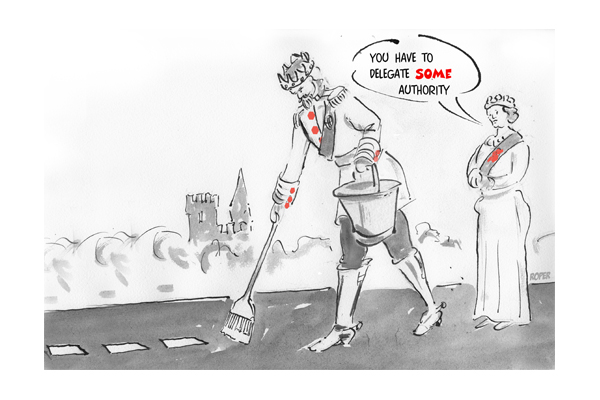If you’ve been leading your business for a while, you’ll know the pattern: your diary’s full, your brain’s busier, and somehow your team still relies on you for more decisions than you’d like.
You delegate, but it never quite sticks. People come back with questions, half-finished projects, or a need for your sign-off before they take the next step. And so, the wheel turns again, and end up doing the very work you hired others to do.
But what if the problem is the way you’re delegating?
Managing tasks – or delegating accountability?
Most leaders delegate in a piecemeal way – handing out individual tasks but keeping the accountability for results. This way, you remain the ‘hub’ everyone reports into. It’s safe and familiar. But it’s also exhausting and ultimately unsustainable.
There’s a smarter way. It’s to shift from managing tasks to delegating outcomes – giving someone full accountability not just for doing the work, but for deciding what success looks like and agreeing how it’s measured.
That’s the principle behind what’s called distributed leadership – and it’s surprisingly liberating. When you delegate accountability rather than activity, you stop being the bottleneck. You create real ownership. And you reclaim some headspace for the things only you can do.
Why this matters for growing SMEs
Most small and medium-sized businesses hit a stage – typically between 20 to 30 people – where the founder can no longer oversee everything. What used to feel entrepreneurial now starts to feel chaotic. Decisions slow down. Bottlenecks multiply. The organisation becomes over-reliant on a handful of people (especially you).
If that sounds familiar, this is exactly the point at which you need to shift your leadership model.
Delegating accountability, not just responsibility, transforms how people feel about their roles. It gives them permission to think, make decisions, and own results. It’s not about dumping the hard stuff on them; it’s about inviting them to step up, lead, and grow.
Who’s tried it?
Companies like GE Appliances, Fidelity Investments, and even the New Diorama Theatre in London have experimented with this kind of distributed leadership. Instead of top-down management, they’ve created small, semi-autonomous teams, each accountable for its own P&L, its own priorities and its own definition of success.
The results have been higher productivity, lower burnout, and a much greater sense of ownership. People enjoy their work more because they’re trusted to make decisions that matter. They’re not just completing tasks – they’re building something.
You don’t have to be a corporate giant to apply this. I’ve seen the same transformation happen in owner-led firms, once leaders start saying things like:
“You own the customer onboarding process. Your goal is to make it smooth, fast, and human. You decide how to measure that – and what to change if it slips.”
That’s a very different conversation from:
“Can you update the onboarding checklist by Friday?”
The paradox of delegation
The irony is that when you give away more control, you get more done. Not because people work harder, but because they work smarter. They stop doing unnecessary tasks, duplicating effort, or waiting for your approval to move forward.
This approach also surfaces better decisions. When people closest to the work decide what’s worth doing and what isn’t, a lot of ‘nonsense work’ disappears. Reports that no one reads. Meetings that add no value. Endless rework.
Your role then becomes less about directing and more about coaching. You still hold people to account – but for results, not routines. You help them learn how to think about outcomes, not just steps in the process.
How to start
If you’re ready to try this, start small. Pick one area where you’re currently too involved and ask yourself:
- What’s the outcome I actually want here? Not “run the meeting” or “update the system”, but “improve client satisfaction” or “reduce response times”.
- Who could own that outcome? Choose someone capable and motivated – even if they’re not the obvious choice.
- How will they know what good looks like? Work with them to define the measures of success – then let them decide how to get there.
- What support will they need from you? Set up regular check-ins – not to monitor, but to coach and clear obstacles.
- What will you stop doing as a result? This is the hardest bit. Step back, and give them room to lead.
The real win
Delegating outcomes rather than tasks does more than ease your workload. It changes the culture. People become more engaged because they feel trusted and respected. Accountability shifts from ‘doing what the boss says’ to ‘delivering what we’ve agreed matters’.
And you get to focus on leading – shaping direction, nurturing capability, and keeping the organisation aligned – instead of micromanaging the day-to-day.
It’s not about giving busy people more to do. It’s about giving them more power to make good things happen.
Would you like some help in passing more accountability down to your team? Perhaps you’re looking ahead to stepping back from your day-to-day involvement in your company? Or perhaps you’d just like to free up some time and brain space? Give me a call (07801 259637) or drop me a line (km@leaderslab.co.uk) for a chat about how I can help.
